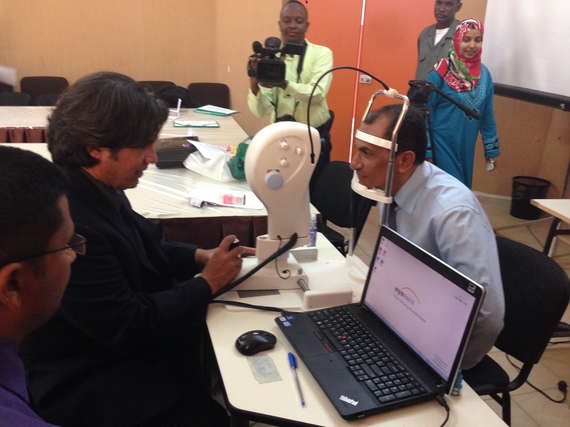H.E. Dr. Nabil Mohammed, Minister of Higher Education, with Dr. Jorge Cuadros operating the iCam retinal camera
Djibouti, December 14
This past week 11 clinicians and medical students in the Red Sea country of Djibouti received training and began a 3-month pilot program to perform tests to detect Diabetic Retinopathy (DR), a degeneration of the lining of the eye, often associated with diabetes. DR causes blindness and is asymptomatic, but early detection can save sight. Djibouti is an entrepot-state of about 20,000 sq. km, and 800,000 people, located between Somalia, Ethiopia, Eritrea and Yemen.
The effort, which was inaugurated by Djibouti's Minister of Higher Education, Dr. Nabil Mohamed on December 11, and organized by Perim Associates LLC, an Africa-focused law & development consultancy, was implemented by the University of California at Berkeley School of Optometry and EyePACS, an innovative California-based telemedicine initiative. As of last week, the Djiboutian contingent had begun using the EyePACS training and grading system to screen diabetes sufferers for retinopathy, with 35 cases completed. Of that initial sample, 43 percent were found to have either diabetic retinopathy, glaucoma or cataracts.
Dr. Jorge Cuadros, Professor of Optometry at U.C. Berkeley and CEO of EyePACS LLC explains that while the problem is well known, the basic solution is counter intuitive: "We are trying to put DR screening into the hands of primary care physicians -- not eye-care professionals." This concept is catching on quickly, but is counter-intuitive to many, including, ironically, eye-care professionals. Cuadros' mantra is that "by the time most people suffering from DR go to an eye care professional -- it's often too late to save vision."
Compounding the problem, he explains, is that when a person with late-stage DR seeks treatment, he or she often associates that treatment with loss of sight, discouraging others from seeking either testing or treatment. "If we can test early and widely, we can save many from this fate. The testing technology is now there, it's simple, portable, and it works really well."
Further, Cuadros stresses, by putting testing into the hands of primary care doctors, nurses, and other clinicians, eye-care professionals have more time to focus on treatment There are in Djibouti, for example, only two ophthalmologists in the whole country.
EyePACS, in conjunction with faculty and students at Berkeley, will provide remote/telemedicine and on-site quality assurance and diagnostic support to the Djiboutian physicians for the duration of the pilot, which is expected to add greatly to knowledge of diabetes and other health indicators in the country, which is working aggressively to develop its medical research and educational infrastructure.
Dr. Ayoub Mohamed, of Djibouti's Higher Institute for Health Sciences, which is hosting the program, highlighted the knowledge-generating value of the study: "the rate of incidence of DR is basically unknown in Djibouti, yet it is clearly present -- and likely prevalent, as is diabetes. We expect this study will generate awareness among the general population, which is currently very low. Perhaps even more important, we expect to have some idea of just how big a problem it is, and what to do about it. We have the students now, bringing their diabetic family members for screening. Everyone here is getting involved."
The effort follows a similar program in 2013 that trained 11 Libyan doctors in the same imaging techniques. Implementation of that program has been delayed by the worsening conflict in that country, but hopes are that the first tests will be started early this year. EyePACS has implemented programs in the U.S. and Mexico that have tested more than 300,000 people for DR, and saved the eyesight of tens of thousands of people.
